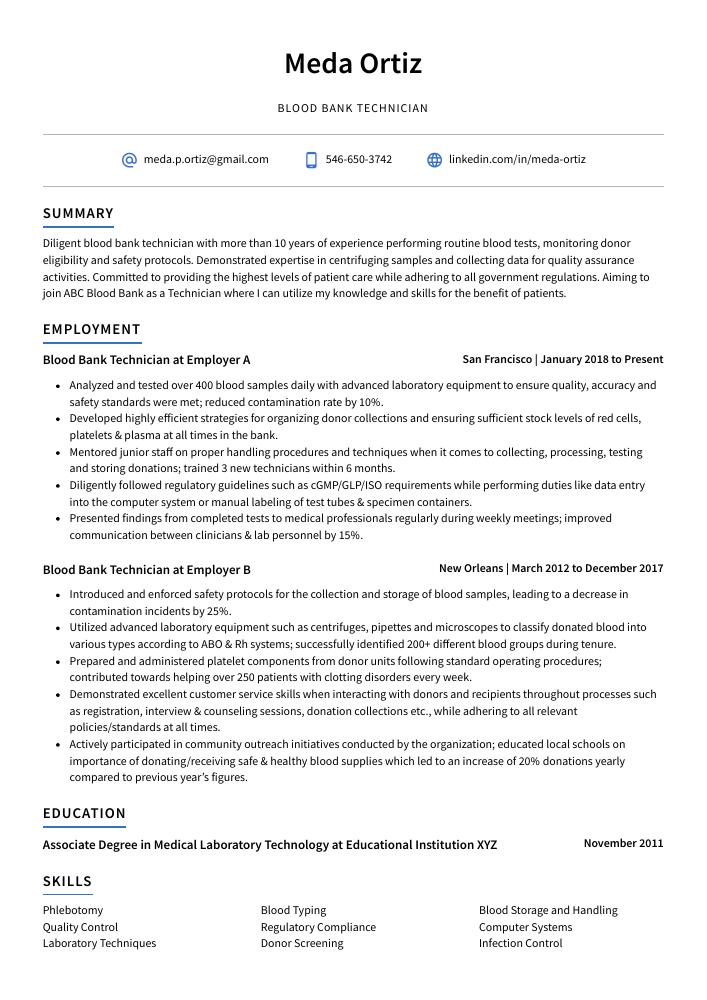Blood Bank Technician Resume Guide
Blood bank technicians collect, process and test blood donations to ensure that it is safe for transfusion. They also inspect equipment used in the collection of blood and prepare reports on laboratory tests conducted on donated samples.
You have the knowledge and experience to be a great blood bank technician, but hiring managers don’t know who you are. To get their attention, you must create an impressive resume that highlights your qualifications for this role.
This guide will walk you through the entire process of creating a top-notch resume. We first show you a complete example and then break down what each resume section should look like.
Table of Contents
The guide is divided into sections for your convenience. You can read it from beginning to end or use the table of contents below to jump to a specific part.
Blood Bank Technician Resume Sample
Meda Ortiz
Blood Bank Technician
[email protected]
546-650-3742
linkedin.com/in/meda-ortiz
Summary
Diligent blood bank technician with more than 10 years of experience performing routine blood tests, monitoring donor eligibility and safety protocols. Demonstrated expertise in centrifuging samples and collecting data for quality assurance activities. Committed to providing the highest levels of patient care while adhering to all government regulations. Aiming to join ABC Blood Bank as a Technician where I can utilize my knowledge and skills for the benefit of patients.
Experience
Blood Bank Technician, Employer A
San Francisco, Jan 2018 – Present
- Analyzed and tested over 400 blood samples daily with advanced laboratory equipment to ensure quality, accuracy and safety standards were met; reduced contamination rate by 10%.
- Developed highly efficient strategies for organizing donor collections and ensuring sufficient stock levels of red cells, platelets & plasma at all times in the bank.
- Mentored junior staff on proper handling procedures and techniques when it comes to collecting, processing, testing and storing donations; trained 3 new technicians within 6 months.
- Diligently followed regulatory guidelines such as cGMP/GLP/ISO requirements while performing duties like data entry into the computer system or manual labeling of test tubes & specimen containers.
- Presented findings from completed tests to medical professionals regularly during weekly meetings; improved communication between clinicians & lab personnel by 15%.
Blood Bank Technician, Employer B
New Orleans, Mar 2012 – Dec 2017
- Introduced and enforced safety protocols for the collection and storage of blood samples, leading to a decrease in contamination incidents by 25%.
- Utilized advanced laboratory equipment such as centrifuges, pipettes and microscopes to classify donated blood into various types according to ABO & Rh systems; successfully identified 200+ different blood groups during tenure.
- Prepared and administered platelet components from donor units following standard operating procedures; contributed towards helping over 250 patients with clotting disorders every week.
- Demonstrated excellent customer service skills when interacting with donors and recipients throughout processes such as registration, interview & counseling sessions, donation collections etc., while adhering to all relevant policies/standards at all times.
- Actively participated in community outreach initiatives conducted by the organization; educated local schools on importance of donating/receiving safe & healthy blood supplies which led to an increase of 20% donations yearly compared to previous year’s figures.
Skills
- Phlebotomy
- Blood Typing
- Blood Storage and Handling
- Quality Control
- Regulatory Compliance
- Computer Systems
- Laboratory Techniques
- Donor Screening
- Infection Control
Education
Associate Degree in Medical Laboratory Technology
Educational Institution XYZ
Nov 2011
Certifications
Certified Phlebotomy Technician (CPT)
American Society
May 2017
1. Summary / Objective
Your resume summary should be a concise and compelling summary of your professional experience as a blood bank technician. Include information such as the number of years you have worked in this field, any certifications or qualifications you hold, and how many successful donations/transfusions you have been involved with. You could also mention the types of equipment and software programs that are familiar to you.
Below are some resume summary examples:
Detail-oriented blood bank technician with 3+ years of experience working in a busy hospital laboratory. Experienced in processing, testing and issuing blood components for transfusions to patients. Skilled at collecting and preparing samples for analysis, utilizing the latest techniques and technologies to ensure accuracy of results. Successfully maintained a 99% error-free rate on all tests conducted over the past two years at XYZ Hospital.
Proficient blood bank technician with 5+ years of experience handling donor screening, specimen processing and analysis. Seeking to use expertise in phlebotomy, blood typing and antibody cross-matching at ABC Medical Center to ensure the highest quality standards for patients while preserving their safety. Recognized as Employee of the Month 3 times for outstanding performance in collecting samples from donors efficiently and accurately.
Skilled blood bank technician with over 6 years experience in the industry. At XYZ, managed all aspects of daily operations and quality control for a major hospital blood bank. Expertise includes organizing donor drives, performing tests to ensure safety of donated samples, and preparing reports on test results. Additionally experienced in managing inventory levels at optimal rates while adhering to strict regulatory guidelines.
Talented and certified blood bank technician with five years of experience in ABC Blood Bank. Skilled at collecting, processing, testing and storing donor samples while maintaining compliance with laboratory safety protocols and SOPs. Successfully implemented new processes to increase efficiency in the lab by 15%. Highly motivated professional who is passionate about helping others through the donation process.
Determined and organized blood bank technician with 3+ years of experience performing testing, processing samples, and providing quality assurance in a high-volume laboratory. Seeking to bring my expertise in donor screening and specimen collection to ABC Blood Bank as the next Lead Technician. Recognized for exceptional accuracy in sample analysis that led to an 8% decrease in errors over two years.
Enthusiastic blood bank technician with 5+ years of experience providing technical and administrative support to a leading hospital. Seeking to join ABC Medical Center as the next blood bank technician, leveraging an in-depth knowledge of laboratory standards and protocols while maintaining superior quality control and accuracy. Reorganized the existing donor database, increasing efficiency by 30%.
Well-rounded Blood Bank Technician with professional experience in the collection, screening and storage of blood products. Experienced in working closely with medical staff to ensure optimal safety measures are followed during donations and subsequent processing. Demonstrated expertise in patient care activities including donor counseling, specimen labeling, data entry and inventory management.
Energetic blood bank technician with 4+ years of experience managing blood donations and conducting laboratory tests. At XYZ, successfully implemented a new system for tracking inventory that resulted in an increase in the accuracy of product orders by 20%. Seeking to use my organizational skills and attention to detail at ABC Blood Bank to ensure accurate results and efficient processes.
2. Experience / Employment
The employment (or experience) section is where you talk about your work history. It should be written in reverse chronological order, meaning the most recent job is listed first.
When writing this section, stick to bullet points; doing so allows the reader to quickly take in what you have to say. When writing each point, make sure that it contains detail and quantifiable results if possible. For example, instead of saying “Performed blood tests,” you could say “Conducted over 500 blood tests per week for various diseases using ELISA technology.”
To write effective bullet points, begin with a strong verb or adverb. Industry specific verbs to use are:
- Collected
- Processed
- Monitored
- Tested
- Analyzed
- Stored
- Labeled
- Transported
- Inspected
- Recorded
- Prepared
- Operated
- Calibrated
- Administered
- Disposed
Other general verbs you can use are:
- Achieved
- Advised
- Assessed
- Compiled
- Coordinated
- Demonstrated
- Developed
- Expedited
- Facilitated
- Formulated
- Improved
- Introduced
- Mentored
- Optimized
- Participated
- Presented
- Reduced
- Reorganized
- Represented
- Revised
- Spearheaded
- Streamlined
- Structured
- Utilized
Below are some example bullet points:
- Proficiently collected and processed over 400 donations each month, ensuring the safety of all blood products before they were issued to hospitals.
- Reorganized existing inventory system in order to efficiently manage a large number of donated units; decreased wastage rate by 20%.
- Coordinated with medical personnel from multiple departments for issuing appropriate blood components as per patient requirements; increased customer satisfaction ratings by 10%.
- Collected data on donor information & health history via electronic database systems, allowing for better tracking & monitoring of overall supply chain operations.
- Spearheaded weekly quality control processes and implemented new best practices which improved accuracy rates by 25% within 3 months’ time frame.
- Advised over 200 donors per day on eligibility for blood donation and collected samples from over 150 qualified individuals each week; improved donor recruitment rate by 30%.
- Stored, labeled and tracked over 500 pints of donated blood in the lab’s inventory system with 100% accuracy; reduced contamination risk due to incorrect labeling or storage by 15%.
- Improved daily operational efficiency by introducing a new online scheduling system that decreased wait times for donors by 20 minutes on average.
- Reliably produced high-quality results when testing and screening all samples according to prescribed protocols within specified time frames; increased laboratory productivity levels by 10%.
- Administered quality assurance tests regularly to ensure proper functioning of equipment used in the lab at all times, reducing downtime incidents significantly (by 25%).
- Operated blood bank systems and equipment to collect, process, store and distribute blood products; successfully collected over 2,000 units of blood from donors in the last 12 months.
- Efficiently managed inventory levels for all medical supplies used during collection procedures; reduced downtime by 15% due to fewer backorder issues.
- Optimized quality control processes with regular calibration of equipment to ensure accurate results; improved accuracy rates on tests performed by 10%.
- Calibrated centrifuges according to manufacturer instructions as part of preventive maintenance routines and decreased malfunction rate by 25%.
- Transported lab specimens between processing centers using appropriate packaging materials while adhering strictly to biohazard regulations at all times.
- Disposed of expired blood products in accordance with safety protocols and regulations, resulting in 100% compliance with the local healthcare department.
- Streamlined donation processes by organizing blood drives and ensuring the proper storage of collected samples; boosted donations by 20%.
- Consistently provided accurate cross-matching for transfusions that resulted in no complications or adverse reactions from patients receiving donated blood supplies.
- Reduced potential contamination risks through careful handling of donor materials during phlebotomy sessions; averted a total of 8 incidents over 6 months period.
- Structured patient records using a secure electronic database system to ensure quick retrieval when needed; improved record access time by 30 minutes on average per request query.
- Assessed donor eligibility and prepared blood samples for testing by conducting over 400 laboratory tests per day, ensuring compliance with donor screening requirements.
- Labeled and stored collected blood specimens accurately in order to maintain records of all donated units; reduced time spent on labeling errors by 75%.
- Inspected equipment used during blood collection process, including centrifuges, pumps, needles and phlebotomy chairs; identified potential safety risks ahead of time and prevented any incidents from occurring.
- Thoroughly cleaned medical tools after each use according to established protocols to reduce the risk of infection or contamination in the facility; decreased downtime due to cleaning-related issues by 55%.
- Formulated solutions such as saline mixtures and anticoagulants for storage purposes while maintaining high standards of sterility throughout preparation process; improved overall efficiency levels at the Blood Bank by 15%.
- Achieved a 98% accuracy rate in data entry and processing of donor information into the hospital’s database, resulting in a 20% increase in blood donations.
- Recorded patient vitals accurately and promptly upon receiving donation samples from over 500 donors each month; noted any irregularities to ensure the safety of transfusions for recipients.
- Compiled detailed reports on daily blood bank operations including collection, storage, testing & distribution activities as required by regulatory authorities; reported discrepancies within 24 hours to maintain compliance with regulations at all times.
- Revised blood typing procedures regularly based on feedback from laboratory technicians regarding improved efficiency when conducting tests for compatibility between donors & patients; reduced time spent per test by 15 minutes overall.
- Meticulously inspected equipment used for collecting and storing donated units before use according to established protocols, ensuring that quality standards were met every single day without fail.
- Represented the blood bank in 50+ donor drives, successfully recruiting 500 new donors and increasing donations to the hospital by 20%.
- Expedited the process of collecting, testing and distributing donated blood; reduced turnaround time from 3 days to 24 hours for urgent requests.
- Processed over 200 samples a day using advanced centrifuge equipment; maintained compliance with all safety protocols as required by regulatory bodies such as FDA & AABB.
- Confidently identified potential compatibility issues between donor-recipient pairs during crossmatching tests and efficiently rerouted samples when necessary.
- Participated in quality improvement initiatives that led to an overall reduction of 5% laboratory errors while handling specimens within a given month period.
- Facilitated the collection and processing of over 200 blood donations per week, ensuring that necessary safety protocols were followed at all times.
- Monitored the temperature and quality control parameters of donated blood samples, identifying anomalies to improve accuracy in testing; reduced false-positive results by 15%.
- Tested collected samples for various diseases such as HIV/AIDS, hepatitis B & C, malaria and syphilis using advanced laboratory equipment; increased detection rate from 70% to 90%.
- Independently managed the inventory system for both donor supplies and lab reagents with 100% accuracy, saving $1K annually due to better purchasing decisions.
3. Skills
Skill requirements will differ from employer to employer – this can easily be determined via the job advert. Organization ABC may require experience in the collection and processing of blood products, while Organization XYZ may require a working knowledge of laboratory equipment.
It is essential to tailor your skills section to each job you are applying for as many employers use applicant tracking systems these days; they scan resumes for certain keywords before passing them on to a human.
In addition to listing relevant skills here, it would be beneficial if you elaborated on some of the most important ones in other areas such as the summary or work history sections.
Below is a list of common skills & terms:
- Blood Storage and Handling
- Blood Typing
- Communication and Customer Service
- Computer Systems
- Donor Screening
- Infection Control
- Laboratory Techniques
- Phlebotomy
- Quality Control
- Regulatory Compliance
4. Education
Adding an education section to your resume will depend on the amount of experience you have. If you just graduated and don’t have any work history, it is important to include an education section below your resume objective. However, if you already have significant professional experience in a related field, omitting this section altogether may be wise.
If including an education section, try to mention courses taken or degrees earned that are relevant to the blood bank technician role for which you are applying.
Associate Degree in Medical Laboratory Technology
Educational Institution XYZ
Nov 2011
5. Certifications
Certifications are a great way to demonstrate to potential employers that you have the necessary skills and knowledge for the job. They also show that you are committed to professional development and keeping up with industry trends.
When applying for jobs, make sure your certifications are relevant and listed prominently on your resume so hiring managers can easily identify them. This will help give you an edge over other applicants who may not possess such credentials.
Certified Phlebotomy Technician (CPT)
American Society
May 2017
6. Contact Info
Your name should be the first thing a reader sees when viewing your resume, so ensure its positioning is prominent. Your phone number should be written in the most commonly used format in your country/city/state, and your email address should be professional.
You can also choose to include a link to your LinkedIn profile, personal website, or other online platforms relevant to your industry.
Finally, name your resume file appropriately to help hiring managers; for Meda Ortiz, this would be Meda-Ortiz-resume.pdf or Meda-Ortiz-resume.docx.
7. Cover Letter
Including a cover letter with your job application is a great way to make yourself stand out from the competition. It offers you the opportunity to provide more detail about who you are and why you believe that this role would be an excellent fit for both parties.
Cover letters should typically include 2-4 paragraphs which go beyond what’s already included in your resume. They allow recruiters to get a better insight into who you are as a professional, giving them further reasons on why they should hire you over other candidates.
Below is an example cover letter:
Dear Roma,
I am writing to apply for the Blood Bank Technician position at New York-Presbyterian Hospital. With more than five years of experience working in blood banks, I have the skills and knowledge needed to make a positive impact on your team.
In my current role as a Blood Bank Technician at Mount Sinai Hospital, I perform all aspects of blood bank testing including compatibility testing, crossmatching, and special procedures. I am also responsible for maintaining inventory levels and ordering supplies as needed. My attention to detail ensures that all tests are performed accurately and that patients receive the correct type of blood.
In addition to my technical skills, I have excellent customer service skills which are essential when working with hospital staff and patients. My ability to remain calm under pressure has allowed me to effectively handle challenging situations.
I am confident that I can be an asset to your team and would welcome the opportunity to discuss how my experience could benefit New York-Presbyterian Hospital. Thank you for your time and consideration; I look forward to hearing from you soon.
Sincerely,
Meda
Blood Bank Technician Resume Templates
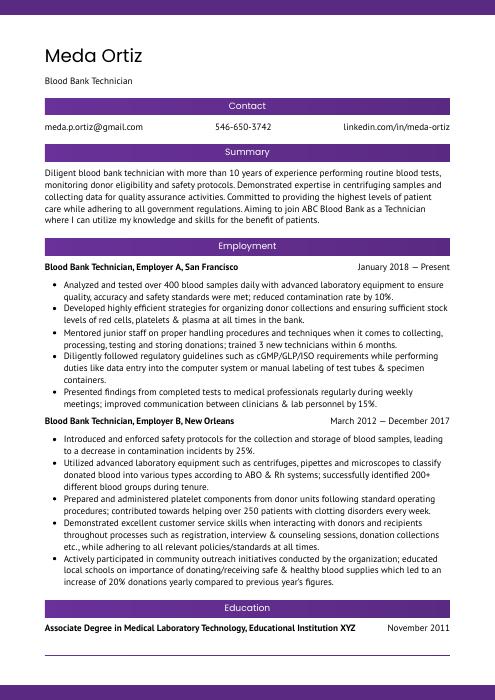 Jerboa
Jerboa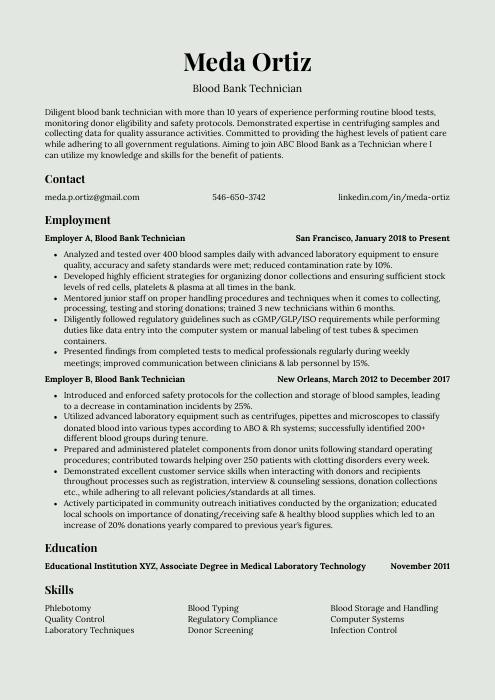 Saola
Saola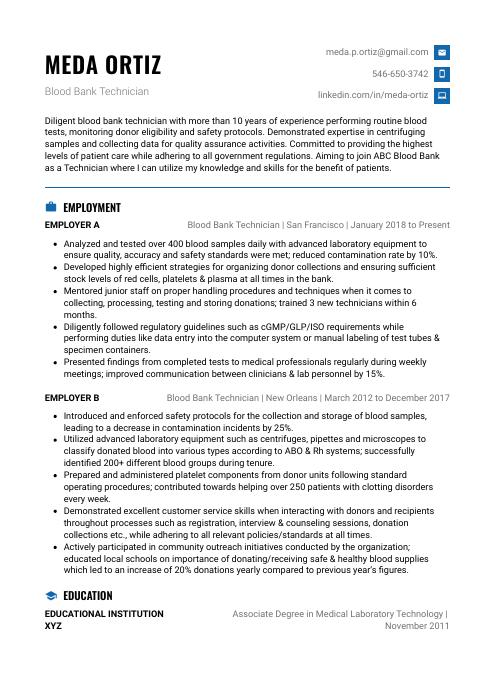 Echidna
Echidna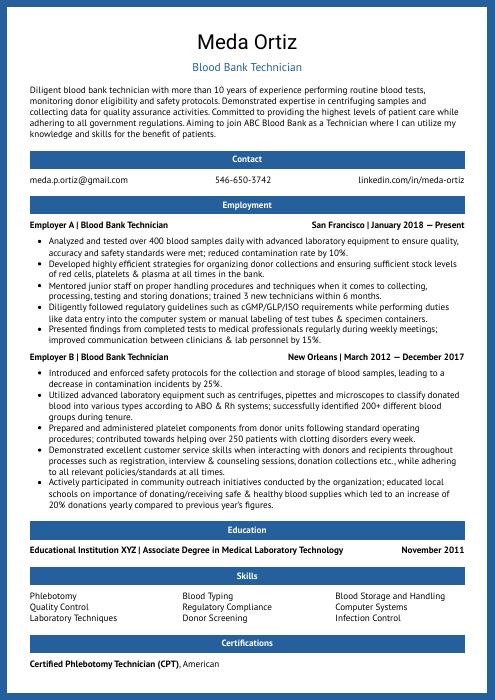 Ocelot
Ocelot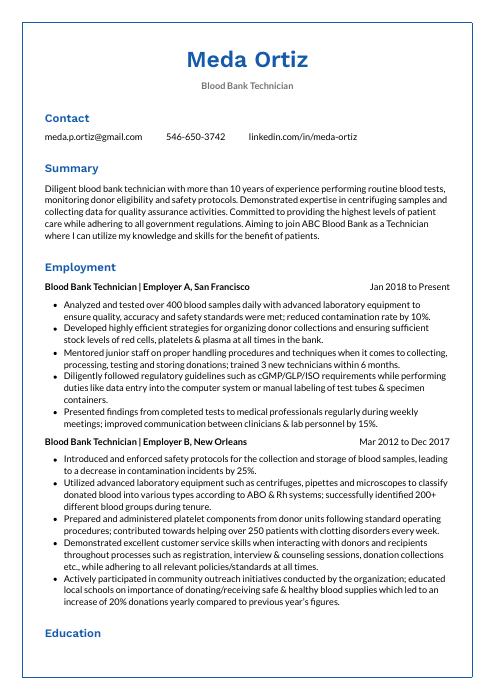 Markhor
Markhor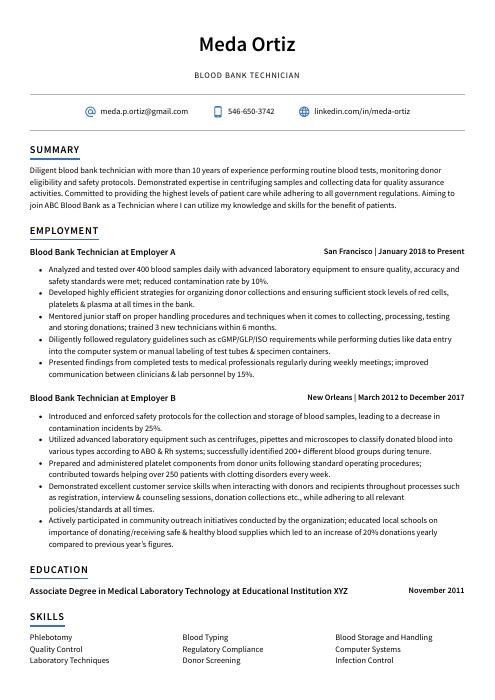 Axolotl
Axolotl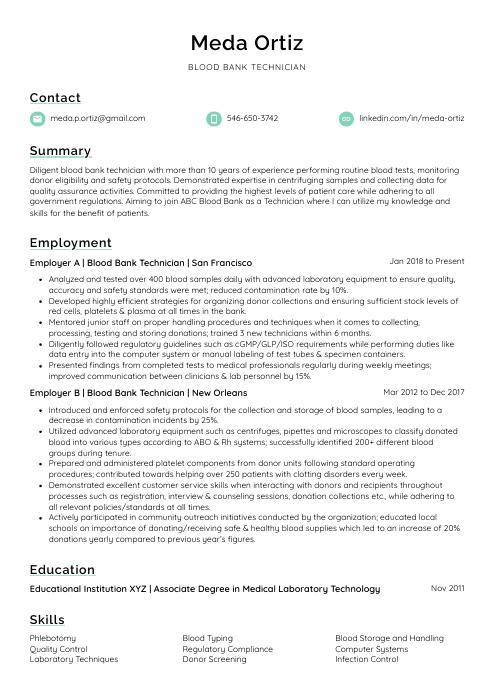 Lorikeet
Lorikeet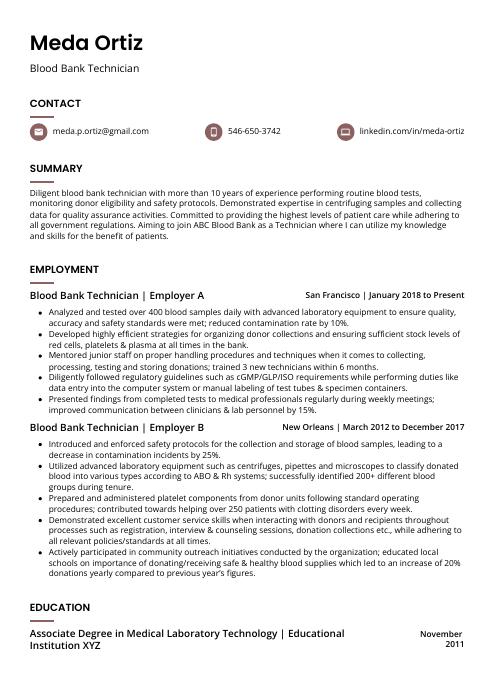 Fossa
Fossa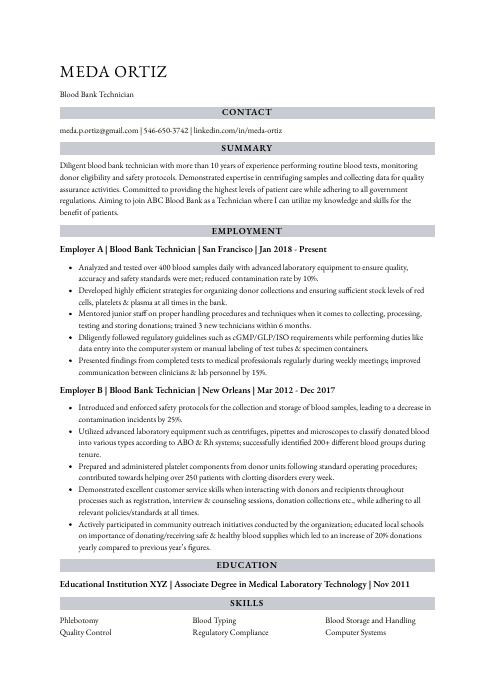 Numbat
Numbat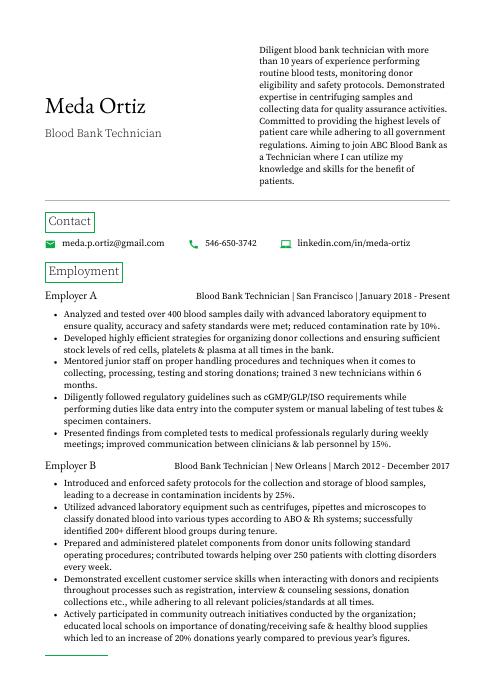 Quokka
Quokka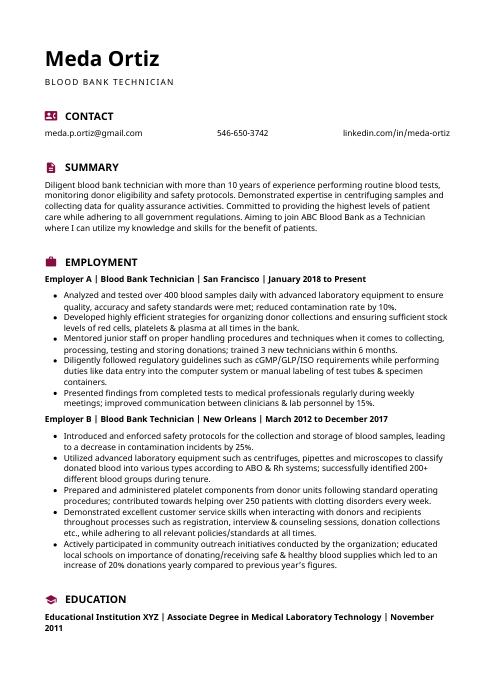 Hoopoe
Hoopoe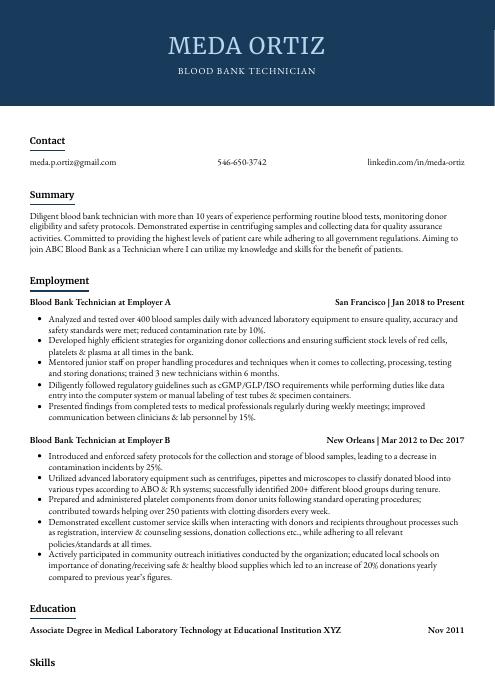 Bonobo
Bonobo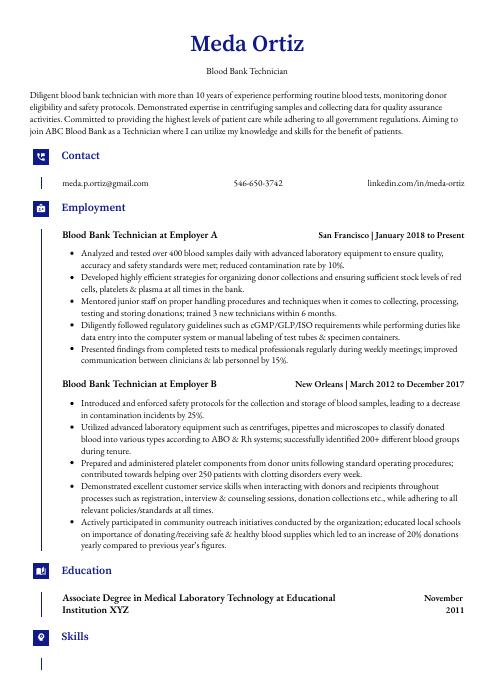 Gharial
Gharial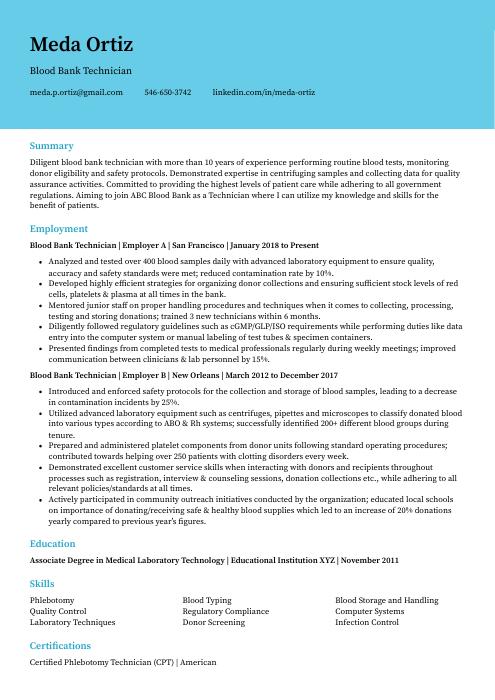 Dugong
Dugong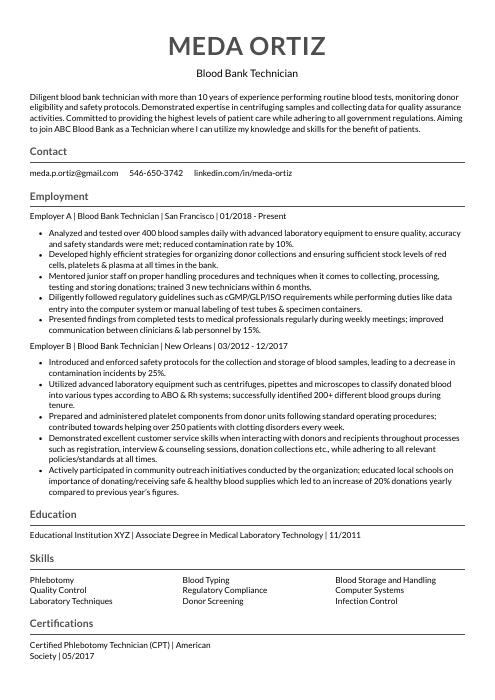 Indri
Indri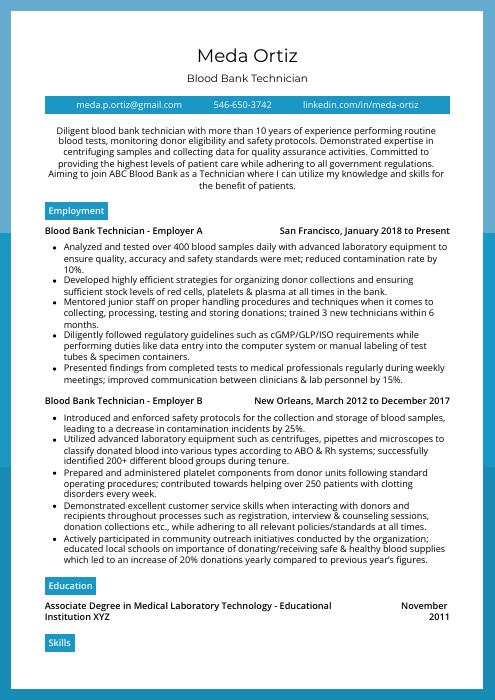 Rhea
Rhea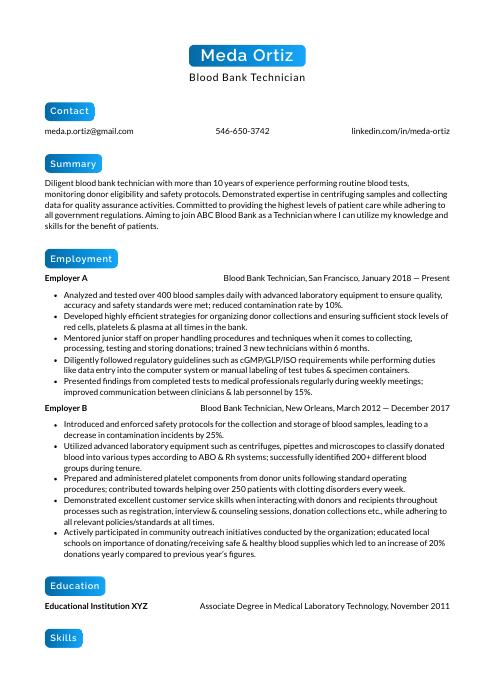 Kinkajou
Kinkajou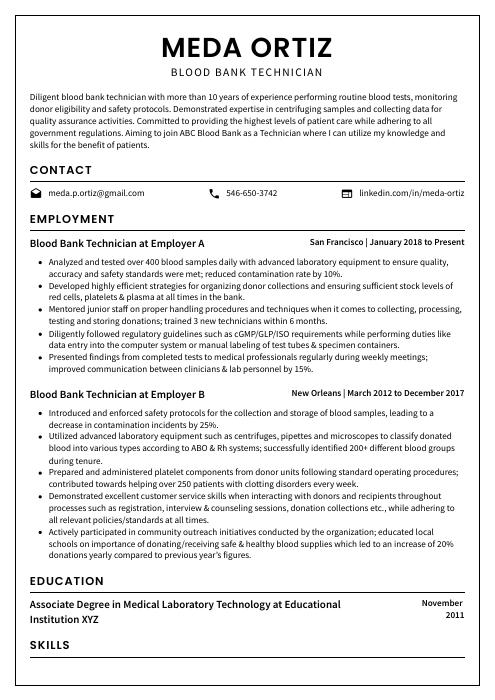 Cormorant
Cormorant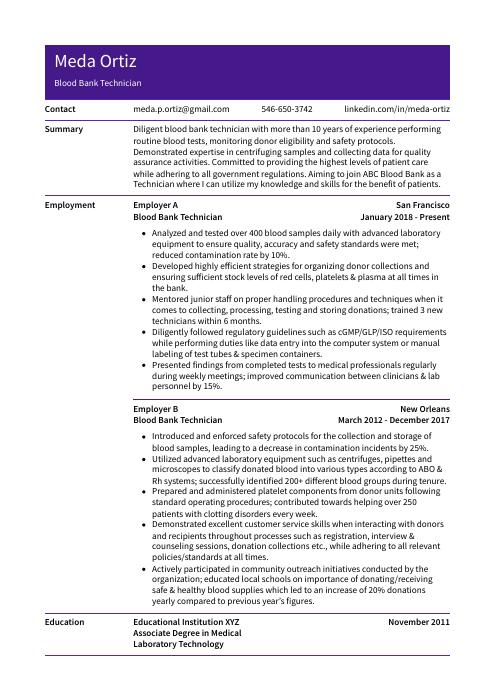 Pika
Pika Rezjumei
Rezjumei
